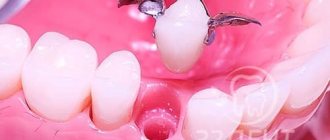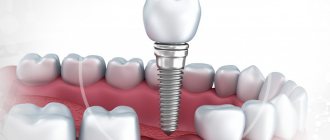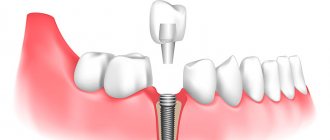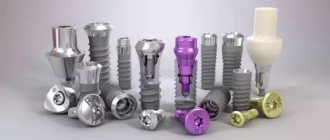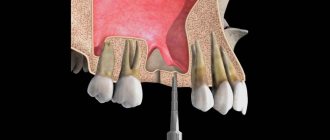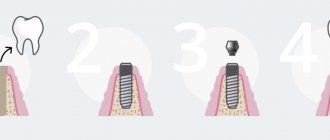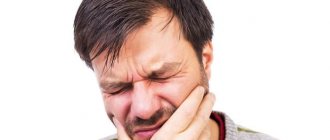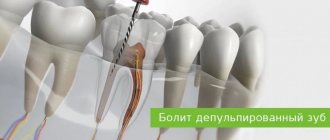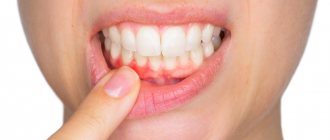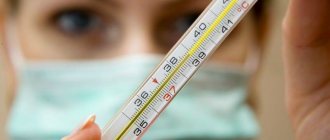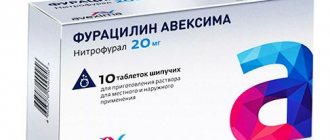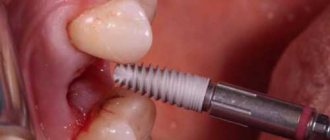The procedure of removing a tooth or tooth root is a common operation in dental surgery. It must be performed by a dentist-surgeon. During tooth extraction, tissue and blood vessels are damaged, leaving a wound filled with thickening blood.
To ensure healing proceeds quickly and there are no complications, you should follow simple recommendations after tooth extraction:
- remove the gauze pad no earlier than 20 minutes after the procedure;
- do not eat for 2 hours;
- Do not eat hot food during the next day;
- do not rinse your mouth;
- do not eat food that is harmful to the oral cavity;
- do not examine the wound using improvised means;
- do not apply compresses;
- Do not overcool, do not overheat, and do not undergo physical exertion for several days.
When following the recommendations, a lot of questions still arise. Let's look at the most common ones.
Content:
- A tooth has been removed: can you or can’t smoke?
- Why smoking after removal is undesirable
- Is it possible to smoke after tooth extraction if there are stitches on the gums?
- Smoking and anesthesia are an undesirable combination
- Useful information about the effect of nicotine on the mucous membranes of the oral cavity
- How to speed up the healing of a hole
A person who has just had a tooth removed is usually nervous. This is understandable - he has suffered stress and wants to relax. Smokers often use cigarettes to calm down, but the question arises: when can you smoke after dental surgery? We suggest you look into it.
When is the best time to remove a wisdom tooth?
It is better to remove a wisdom tooth when it does not hurt!
Are you faced with the fact that the doctor recommended that you remove a wisdom tooth on the upper or lower jaw? Most likely there are certain indications for this.
Any surgical intervention during a period of acute inflammatory process occurs and is tolerated more difficult than during a period of relative rest. The healing period in such cases is more painful and longer.
Therefore, do not wait until the tooth hurts (IT WILL DEFINITELY HURT).
If you doubt or don’t trust a doctor, consult another one; if you have doubts, consult a third one.
A tooth has been removed: can you or can’t smoke?
Dental surgeons prohibit smoking during the first two to three hours after extraction. This short period is relevant if:
- the operation was not very complicated;
- the bleeding has stopped completely;
- after removing the gauze swab, blood did not begin to flow again;
- a dense blood clot has managed to form, isolating the wound in the gum.
In severe cases, smoking after tooth extraction will have to be postponed for several days - the exact time period will be determined by the doctor. This is due to the fact that nicotine contained in cigarette smoke irritates the edges of the inflamed hole and causes spasm of blood vessels. Because of this, regeneration processes slow down and dangerous complications can develop.
Recommendations before wisdom tooth removal
It is better to remove wisdom teeth in the morning
The body is full of vital energy in the morning and easily experiences stress. Believe me, even just a visit to the dentist is stressful for some people. After the removal of the eighth teeth (wisdom teeth), pain may appear, which will go away after a few hours. If the operation takes place in the morning, then by the evening the pain will completely disappear and you will go to bed peacefully. In the morning, not only are you full of strength and energy, but so is your doctor. The doctor is not tired yet and is ready to devote maximum concentration of attention and time to the procedure. In case of any complications, you can easily go to the clinic, rather than looking for a 24-hour clinic with sleepy doctors at night or going to an ambulance.
Eat before wisdom tooth removal
(if you are not planning on sedation or general anesthesia) A well-fed person can tolerate stressful situations much easier. After eating, the body releases hormones that help you relax. Concentration decreases a little and you don’t really think about the procedures performed by the dental surgeon. More busy digesting food. A well-fed person's blood clots better than a hungry person's. This can greatly help to avoid unpleasant complications in the postoperative period.
It is strictly forbidden to drink alcohol before and after wisdom teeth removal
Alcohol can greatly change the rheological properties of the blood, which in turn can lead to significant swelling or prolonged bleeding with a risk to life. A person in a state of alcoholic intoxication is not attentive and cannot soberly assess the situation and make decisions. Plus, I’m not able to accurately remember the doctor’s recommendations; all this will lead to unpleasant complications.
What to take before wisdom tooth removal
Before the operation, the doctor will definitely inform you about all the medications that need to be taken before the operation. If you are very worried, you can use mild sedatives - valerian tincture, motherwort tincture, etc. Or the same drugs only in tablet form, for example Tenoten. If a long-term surgical intervention is planned, for example, removal of a retained or dystopic wisdom tooth, or tooth-preserving operations, or tooth implantation, it is reasonable to use non-steroidal anti-inflammatory drugs with a pronounced anti-inflammatory or analgesic effect, antibiotics, and antihistamines. It is better to entrust the choice to your treating dental surgeon about which drug to take.
A good mood is the key to successful treatment
Remember that a good positive attitude will shorten the recovery period and help you overcome surgical procedures more easily.
Anesthesia or pain relief
Local anesthesia is almost universally used in dentistry. All modern anesthetic drugs are non-toxic and hypoallergenic, provided they are selected correctly. Anesthetics used in private dental clinics are absolutely safe. Modern anesthetics can provide complete absence of sensation in the oral cavity for a long time, up to 5 hours. Thereby making the patient’s stay in dentistry comfortable. As an example, many patients fall asleep during dental appointments thanks to good anesthesia. “Anesthesia doesn’t take me away” - every dentist has heard this. The anesthetic affects all people the same. If the anesthesia has no effect (does not take effect) on you, then the doctor does not have the proper skills in administering anesthesia. It is not possible to become infected with infectious diseases during the administration of anesthesia. In private dental clinics, a special carpule syringe system is used, which completely eliminates contact of the solution and needle with the environment and even with the syringe itself. Anesthetics, if chosen correctly, do not affect the fetus during pregnancy and do not affect the composition of breast milk in nursing mothers. The quality of anesthesia can be affected by long-term use of non-steroidal anti-inflammatory drugs with a pronounced analgesic effect (painkillers), narcotics. Anesthetics are not addictive.
How to behave during the removal process
There are a lot of removal techniques and the choice of technique directly depends on the tooth and the situation in the oral cavity. In addition to the tooth extraction itself, the doctor must also ensure a comfortable stay during the process. Do not hesitate to talk about your unusual sensations, this may help the surgeon during the operation. Do not endure the pain, in modern dentistry there is a sufficient amount of anesthetics and, if necessary, the doctor will add anesthesia. During the removal process, you may feel pressure or crunching. The doctor will warn you about this in advance. The removal time depends on the qualifications of the surgeon and the initial situation, on average 15-30 minutes. The hole in the tooth was sewn up. Yes, this happens too. Based on our practice, almost any tooth extraction requires subsequent suturing of the hole, especially when it comes to further implantation in this area. Healing time is reduced and the postoperative period is easier to bear. If you or the doctor have any doubts about whether there is a piece of tooth left there, do not hesitate to ask the doctor a question or take a control X-ray. A gauze swab is not always placed as prescribed by a doctor.
Why smoking after removal is undesirable
If you start smoking after leaving the dentist's office, you may experience dry socket problems. This means that the blood clot formed to protect the wound from the penetration of pathogens will collapse. Then the tissues will be left without a natural barrier. When smoking further cigarettes and eating food, irritating substances will enter the hole. In this case, there is no hope for quick healing.
The inflammatory process that has developed due to dry socket manifests itself:
- pain at the location of the torn unit;
- increased body temperature;
- accumulation of purulent masses in the wound;
- foul breath.
There is no point in hoping that the situation will normalize on its own. If you have a dry socket, you should visit your dental surgeon again as soon as possible.
Alcohol before surgery - possible consequences
Some patients try to drown out toothache and stress by drinking alcohol. But it is prohibited to drink alcohol before dental procedures.
Reasons for the ban:
1. Ethanol reduces the effectiveness of anesthetics. The doctor will be forced to increase the dose, which can lead to an overdose.
2. Painkillers have a large number of side effects. This is nausea, vomiting, vertigo. Alcoholic drinks increase unpleasant symptoms.
3. Ethanol reduces blood clotting. This is fraught with the development of bleeding during and after surgery.
Alcohol consumption increases the risk of complications. And the dentist may refuse to remove a tooth from an intoxicated patient until he has completely sobered up.
Possible complications if you ignore the ban
The more alcohol the patient took, the higher the risk of complications. Frequent ones are:
- ineffectiveness or increased side effects of anesthetics;
- development of bleeding;
- increased risk of allergies to medications used by the doctor;
- increased blood pressure, hypertensive crisis;
- heart attack;
- increased load on the kidneys, liver and, as a result, inflammatory processes in the biliary and urinary systems;
- long-term healing of the wound surface.
Smoking and anesthesia are an undesirable combination
Doctors insist that patients do not smoke for the next two to three hours after extraction for good reason. Anesthetics used during dental surgery make the tissue completely insensitive and reduce the activity of some muscles and can change the breathing rate. It is very important to wait until their effect ends.
Nicotine and carbon monoxide entering the oral cavity during smoking a cigarette cause spasm of blood vessels and reduce oxygen saturation in the blood. The combination of all these factors leads to a situation where the tissues of the mouth do not receive enough oxygen, which is important for their restoration.
Rehabilitation period
Carrying out a sinus lift is a real surgical procedure, so patients should adhere to several recommendations to avoid complications, namely:
- take painkillers and antimicrobial medications prescribed by your doctor;
- keep your mouth clean using a soft toothbrush without using toothpaste;
- limit sports activities during the recovery period;
- avoid cold and allergens, as sneezing, coughing and blowing your nose are prohibited at first;
- refuse diving and air travel;
- do not inflate balloons, walk or lift heavy objects;
- eat only semi-liquid or highly crushed foods;
- do not drink drinks through a straw;
- quit smoking and alcohol.
All these rules and restrictions play a significant role in the process of wound healing after surgery. Unfortunately, some patients do not attach much importance to the consequences that such disorders can provoke. For example, air travel immediately after surgery can cause severe bleeding and rejection of implants, and drinking alcohol contributes to purulent processes on the gums, thins the blood and can provoke bleeding. Among all these points, it is not without reason that there is a ban on the use of tobacco products, since this, in the opinion of many, a relatively harmless habit entails the most unpredictable consequences.
Useful information about the effect of nicotine on the mucous membranes of the oral cavity
The mucous membranes of the human oral cavity are lined with very delicate and easily vulnerable epithelium. With the systematic use of tobacco products, nicotine and toxic tars damage tissue. The situation is aggravated by the negative impact of elevated temperature when inhaling cigarette smoke.
This is why smokers are often diagnosed with gingivitis and periodontitis. The components present in the smoke change the ligamentous apparatus of the tooth. The gums become inflamed. In the absence of adequate treatment and the persistence of a bad habit, the inflammatory process progresses. Then the unit becomes mobile.
Compounds present in cigarette smoke spasm peripheral blood vessels, disrupt tissue trophism and increase inflammation. Most often, the disease occurs without acute pain and bleeding, so the smoker is in no hurry to see a dentist. But, if you go to the doctor late, you can lose your tooth ahead of time.
Bottom line
Cigarette smoke provokes the development of various pathological conditions that prevent the rapid healing of damaged tissues. Therefore, after removing a molar, you should not delay for several hours, and when suturing the gums - for several days. Smoke contains many toxic substances that enter the damaged shell and cause harm.
Also, tobacco smoke dries out the mucous membrane, which poses a danger to the blood cell inside the socket - it is responsible for restoring tissue integrity and preventing the penetration of microbes.
Tightening stretches the facial muscles, which can cause sutures to come apart and increase blood flow. Only strict adherence to the dentist’s advice will help the tissues heal faster, then you can smoke as usual.
Sources used:
- Oral hygiene. Short course / O.A. Kilafyan. - M.: Phoenix, 2014.
- Basics of prevention of dental diseases. Textbook / Yu.M. Maksimovsky, O.V. Saginah. - M.: Vlados-Press, 2005.
- Diagnosis and prevention of dental diseases / Muravyannikova Zhanna Gavrilovna. - M.: Phoenix, 2013.
How to speed up the healing of a hole
Dentists always give the patient individual recommendations that must be followed. But there are general rules that apply to all patients:
- Do not smoke for at least two to three hours.
- Promptly remove the tampon soaked in antiseptic from the postoperative wound. If you forget to do this, the fabric will become a suitable breeding ground for bacteria.
- Do not touch the blood clot covering the wound. It cannot be picked or felt. The speed of recovery directly depends on the state of the clot.
- When rinsing, do not make intense movements that will help wash out the clot. You just need to put the medicinal solution in your mouth and carefully hold it on the side of the extracted tooth.
- Do not apply medications to the affected area that have not been prescribed by a doctor. Such amateur activities can lead to dangerous complications.
- In the first three days after extraction, do not take a hot bath or steam in a bathhouse or sauna.
- Do not eat until the anesthesia wears off. Otherwise, you may bite the tissue of your cheek or lip.
- Take only those medications prescribed by your dentist. Sometimes doctors decide to prescribe antibiotics - they must be taken strictly according to the specified regimen.
How the regeneration process will proceed depends not only on the actions of the dental surgeon, but also on the behavior of the patient. Remember this!
Electronic cigarettes after sinus lifting and bone grafting
Vaping (vaping) using electronic cigarettes is also prohibited after sinus lift surgery. Vaping has the same negative aspects as traditional smoking. The patient's oral mucosa dries out, blood vessels spasm, and general health worsens. No sane doctor would allow smoking or vaping after surgery.
The patient may smoke after a sinus lift only at his own risk. However, it is worth weighing the pros and cons before lighting a cigarette. The risks are quite impressive:
- Lost time (implantation is a rather long process) due to non-compliance with recommendations.
- Losing money (sinus lift is an expensive operation), and if the bone tissue does not heal due to smoking, you will have to repeat the surgery.
- Losing your own health. When a patient comes for an implant consultation, their main goal is healthy teeth. However, the smile of a heavy smoker will never be healthy.
Therefore, you should think about whether you really want to sacrifice money, time and your health just for cigarettes? Perhaps the recovery period after a sinus lift is your ideal time to quit your addiction forever and significantly improve your quality of life and health.
Lifestyle: do's and don'ts after dental implantation
In general, installing implants is not a reason to give up your usual lifestyle. However, there are still a number of limitations:
- complete cessation of smoking, alcohol, coffee, sweet soda;
- refusal of sports training - cardio and strength training, active running, squats and other exercises;
- visiting a sauna, bathhouse, taking a hot bath, or prolonged exposure to heat and sun is completely prohibited;
- staying in the cold for too long;
- for the first few weeks you need to give up swimming, both in the pool and in open water;
- it is necessary to avoid drafts to prevent colds - during the rehabilitation period it is extremely undesirable to sneeze or blow your nose, this can lead to displacement of the implant.
General mobility, on the contrary, should be increased; walks in the fresh air will also benefit. On the contrary, you cannot spend a lot of time lying down.
To speed up healing, you can take vitamins and mineral complexes.
Methods of teeth whitening in dentistry
There are several types of professional dental teeth whitening. Your doctor can advise you on the most effective method.
Mechanical bleaching
This method is the most accessible and simple. To clean the enamel, dental attachments are used, with the help of which plaque and stones are effectively removed. After the procedure, the doctor applies a gel to the teeth that protects the enamel.
Chemical procedure
The method is gentle. After it, the teeth become lighter by just a few shades. The gums are covered with a latex protective sheet, after which a concentrated whitening solution is applied to the teeth. The procedure will not apply if the patient has veneers, crowns or fillings.
Photobleaching
The procedure allows you to whiten your teeth by 7-8 tones. The doctor applies the whitening gel and shines a lamp on it. The procedure lasts from 15 to 45 minutes. After the procedure, the doctor applies a product with a high fluoride content to reduce tooth sensitivity.
Nutrition after implantation: what we eat and when, and what we refuse
The strictest rules apply to the first day after the procedure. At this time, swelling of the gums and cheeks, slight bleeding, pain and discomfort occurs. In the first few hours after surgery, soft tissue is especially vulnerable to infection, which can lead to more serious complications.
Therefore, in the first 2 hours after implantation, you should absolutely not eat or drink. Violation of this prohibition can lead to suture dehiscence or infection, not to mention increased pain. In addition, it is important to wait until the anesthesia wears off and sensitivity returns, so as not to accidentally bite your tongue, lip or cheek.
If implantation took place under general anesthesia, the first meal is allowed no earlier than 4 hours later. On the first day, you can only take liquid food - broth or puree, and avoid any chewing load. You need to drink as much clean water as possible.
Then you can switch to soft foods - pureed soups, porridges, soft boiled or stewed vegetables. This diet should be maintained for the next two to three weeks. But solid foods, especially crackers, chips, and nuts, should absolutely not be consumed.
For 2-3 weeks after the procedure, you should not eat hot, cold, spicy, too salty, or sour foods. Only warm foods are allowed, not too viscous so that they do not stick to the teeth. But spices and herbs should be avoided, as well as alcoholic beverages.
And most importantly, for the first time you should not chew on the side on which the implantation was placed, so as not to cause an infection and not to load the implanted pin ahead of time.
How to eliminate pain without harming your health
Pain and swelling in the first few days after surgery is normal. To relieve pain, you can take painkillers. These are non-narcotic analgesics, but the specific drug is prescribed by the doctor, taking into account the clinical picture and individual characteristics of the patient. Prescribing painkillers for yourself is strictly prohibited.
Additionally, you can apply a cold compress to your cheek - a heating pad with cold water or ice. But you can do this for no more than 10-15 minutes with a break of 40 minutes. You cannot hold the compress longer, so as not to provoke hypothermia and inflammation.
Rinsing the mouth with a special solution will help relieve or reduce pain; which drug to use should be checked with the specialist who performed the implantation.
To speed up the healing process, you can apply a healing ointment to the operated area.
The use of herbal infusions and decoctions is allowed, but only in consultation with the doctor, since individual components can cause allergies and other reactions. The compositions are used for rinsing the mouth along with antiseptic solutions.
How does smoking generally affect the body?
Let's try to figure out what reaction cigarette smoke causes in the body. As soon as you start smoking, nicotine enters your bloodstream. Next, it provokes a huge release of adrenaline, which causes our heart rate to increase and our blood pressure begins to rise. In order for the heart to maintain increased pressure, which is unusual for our body, it must work faster. Only oxygen can contribute to this. But a person who smokes, on the contrary, receives even less oxygen. It is hemoglobin that transports our blood in the body, and if this is prevented, its deficiency appears. But it is carbon monoxide that prevents hemoglobin from performing its transporter function. Thus, it became clear to us that people who smoke experience a huge lack of oxygen, a deficiency that especially manifests itself during anesthesia.
It is now clear why people who regularly breathe cigarette smoke are at great risk of cardiovascular complications. And there is no question of smoking a cigarette after anesthesia. On the contrary, to eliminate and prevent respiratory disorders, smokers must perform breathing exercises.
